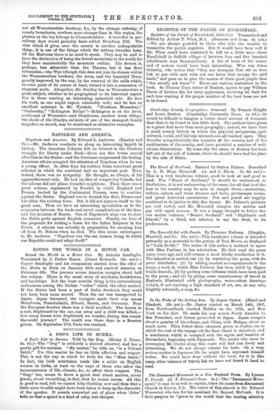NAPOLEON AND AMERICA.
Napoleon and America. By Edward L. Andrews. (Lamley and Co.)—Mr. Andrews conducts us along an interesting bypath in history. The American Colonies felt an interest in the Corsican struggle for liberty under Paoli—there are five towns named after him in the States—and the Corsicans reciprocated the feeling. American affairs occupied the attention of Napoleon when he was a young officer. In after days his restless brain conceived great schemes in which the continent had an important part. Here, indeed, there was no sympathy. He thought, as always, of his aggrandisement only. He had an idea of conquering Canada, but the scheme did not please Canada's neighbour. Then there was a great scheme, engineered by Fouche, in which England and France, backed by the Continental Powers, were to combine against the States. Palgland was to furnish the fleet, France and her allies the military force. But it did not approve itself to the great man. Then we have an interesting speculation as to the connexion between the trade and naval complications of the time and the invasion of Russia. One of Napoleon's aims was to close the Baltic ports against English commerce. Finally, we hear of the proposals for making a home for the fallen Emperor in the States. A scheme was actually in preparation for carrying him eft from St. Helena when he died. The idea seems extravagant to Mr. Andrews. "Napoleon was the one human being to which our Republic could not adapt itself."


























































 Previous page
Previous page